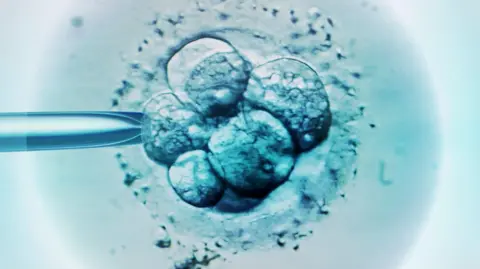ARTICLE AD BOX

 Getty Images
Getty Images
The proportion of IVF cycles funded by the NHS has dropped from 40% in 2012 to 27% in 2022, the UK fertility regulator says.
The Human Fertilisation and Embryology Authority (HFEA) says funding for in-vitro fertilisation treatment varies "considerably" across the UK.
Its latest data also shows people starting IVF later - with the average age for first-time treatment now over 35.
The success rate declines with age, it warns, and early access to treatment is crucial.
'Postcode lottery'
About 52,500 patients had IVF treatment across the UK in 2022, compared with 50,000 in 2019.
In England, NHS funding depends on criteria set by integrated care boards - and in Scotland, Wales and Northern Ireland, national criteria are taken into account.
Clare Ettinghausen, from the HFEA, told BBC Radio 4's Today programme: "It is a so-called postcode lottery and we have seen wide-ranging inequalities
"So [it can depend on not only] where you live, but your relationship status, whether you have a child from a previous relationship.
"Unfortunately, we see black patients have far less funding than white patients - and those in heterosexual couples are most likely to have funding."
'One chance'
David, who has a spinal-cord injury and is paralysed from the chest down, told the Today programme he and his partner, Ashley, both of whom asked for their surnames to be withheld, "have been declined IVF because I have a daughter from a previous partner".
"So apparently that is the rule in the Newcastle areas - but obviously, if I lived in a different part of the UK… we would be allowed it, which, obviously, I think is quite unfair,” he said.
The couple’s GP and MP tried to appeal against the decision, unsuccessfully.
They cannot consider moving to a different area because their house is fully adapted for David.
They are now looking at private options, which would cost them about £10,000, David said, and be unaffordable without his father’s help, for which he is “totally thankful”.
Ashley said: “It is exciting - but I am nervous at the same time.
"We only have one chance for this to work.”
'Rapidly decreases'
Across the UK, average IVF pregnancy rates rose to 31% per fresh embryo transferred in 2022, from 21% in 2012.
Julia Chain, who chairs the HFEA, said: “IVF success rates continue to improve - but as the chance of a birth rapidly decreases with age, early access to fertility treatment is crucial for those who need it.
"Our data shows the average age of patients starting treatment for the first time is now nearly six years older than the average age at which women in England and Wales gave birth to their first child."
The HFEA report suggests several reasons, in addition to the fall in the proportion of cycles funded by the NHS, including:
- delays to many NHS services - particularly gynaecology appointments - after the Covid pandemic
- increased waiting time for tests before being offered NHS-funded treatment
- difficulty funding private treatment, due to the cost-of-living crisis

 10 months ago
40
10 months ago
40








 English (US) ·
English (US) ·